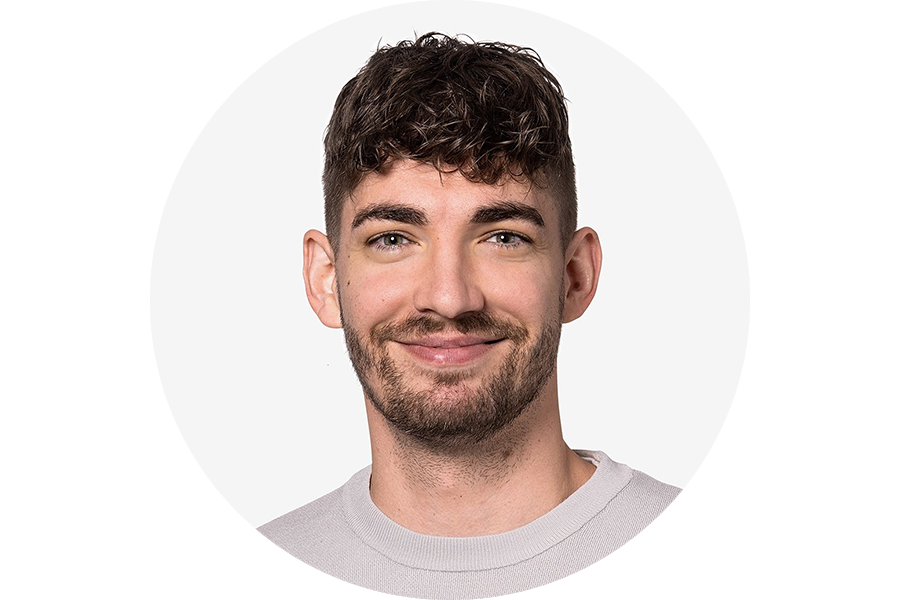
You are here:
Permanent position following a trainee programme or internship: my path at PostFinance
29.09.2025
For graduates, a trainee programme or graduate internship can be a stepping stone into working life. But how do you manage the transition to a permanent position? Simon Mesonero, previously a trainee at PostFinance, talks about his experience – and offers tips for a successful start to your career.

- Trainee programmes and graduate internships provide valuable experience and are a popular way to start a career.
- After completing his trainee programme at PostFinance, Simon Mesonero took up a permanent position in product management and became manager of a team just nine months later.
- In its entry programmes, PostFinance supports graduates with personal support, coaching, mentoring and networking opportunities – including with a view to potential permanent employment.
Want to get started as a trainee or graduate intern at PostFinance?
A trainee programme or graduate internship is not only an exciting way to start your career, it can also open the door to a permanent position. Simon Mesonero made the leap: right after completing his trainee programme at PostFinance, he took on a job in product management – and just nine months later, he was entrusted with leading a team. In this interview, he talks about his experience of starting his career as a trainee, how the permanent position came about and the advice he has for other trainees and graduate interns.
Interview with Simon Mesonero: “I want to stay here – not least because young employees are given real opportunities.”

Simon Mesonero completed his trainee programme in the two areas of Data Management & Governance and Target Group Management.
As someone starting your career, why did you choose a trainee programme at PostFinance?
Simon Mesonero: Towards the end of my studies in business administration, I was looking for a suitable start to my career and came across the trainee position at PostFinance on LinkedIn. The job advertisement alone helped me make up my mind. I had an impression of PostFinance as an attractive employer that also suited me well culturally – so I applied straight way. I also found it particularly exciting that you do two major six-month assignments in different areas, and that you can also work on projects. Because I have many interests but didn’t know at the time where my career journey would take me, this was the ideal combination. In just twelve months, I was able to see a great deal without having to commit myself too early.
When did you realize that you wanted to stick with PostFinance in the long term and go for a permanent position after your trainee programme?
Relatively quickly. For me, alongside the interesting job itself, the decisive factors were the working environment and my colleagues. I really liked the way we interacted with each other, the constructive approach to mistakes and the opportunity to take on responsibility. I realized that I wanted to stay here – not least because I saw that young employees at PostFinance are given real opportunities.
Did you work actively towards a potential permanent position during the trainee programme?
Not directly towards that goal. But I made it known early on that I would basically like to stay at PostFinance, and I talked with many people about that. I always tried to turn in good work and make an impression with my performance. But at the same time, landing a permanent position always involves a little bit of luck.
How did the permanent position come about in the end?
Unfortunately, there turned out to be nothing in the areas where I worked during the trainee programme. But one of my fellow trainees told me about a vacancy in product management. I was ready, applied straight away and went through the standard process. It no doubt also helped that colleagues and managers I had worked with as a trainee put in a good word for me. That’s really worth a lot.
The initiative you show is a key factor in your day-to-day work as a trainee.
What advice do you have for other trainees aiming for a permanent position?
In my experience, it’s a good idea to assume responsibility and take advantage of the opportunities that come your way. Because the initiative you show is a key factor in your day-to-day work as a trainee. You’re also not left to yourself, you can always get support from the team or team leader, especially when it comes to challenging tasks. In Data Management & Governance, I got to work on a key element of AI governance, a topic that was new at the time and relevant to FINMA. And in Target Group Management, I was given the opportunity to help manage a target group – including data analysis and drawing conclusions. Taking advantage of these opportunities is worth your while because they offer a chance to prove yourself.
It’s also helpful to build up and tap into a network in a natural, unaffected way during the programme. For example, if you’ve set your sights on a permanent position, you can let your colleagues know over coffee that your time as a trainee is coming to an end and that job tips are very welcome because you’d like to stay.
And I think one of the most important things is to be yourself. That’s what goes down best. After all, you were hired to some extent because you fit in – just the way you are.
How does a permanent position differ from a trainee programme?
The trainee programme is all about getting to know people and trying things out, and you have a someone who supports you at your side. In a permanent position, you go more deeply into your subject matter, prioritize tasks on your own, make decisions yourself and assume responsibility. You’re also assessed more by your output.
Who would you recommend a trainee programme to as a career start?
Basically to all graduates – unless you already have a very clear plan of where you want your career to go. Often, you don’t even know what’s out there. I myself for example had never worked with data management before I saw the job advertisement about it.
A trainee programme or internship gives you the opportunity to get to know a company, its work culture and ways of working. If it doesn’t work out, you can easily leave after a year. If it does, you’re already fully involved in the processes. For me personally, this made the transition to a permanent position easier. You’re familiar with the processes in the company and you already have a network. Beyond that, well-structured entry programmes like those in place at PostFinance offer very useful workshops where you learn things you would otherwise only learn on the job – such as how does an EAD processwork? How do I behave professionally? Modules like these offer great added value when you’re starting your career.
Do you already have plans for your future career?
I’m very pleased to have been asked to lead the Domestic Payment Journeys team – an early next big step that I didn’t expect when I took up my permanent position. For me, this is a big challenge, one I’m looking forward to, and a responsibility that I will grow into.
Permanent position following graduate internship or trainee programme: how PostFinance supports graduates

Lakshana Sinnadurai, responsible for entry programmes at PostFinance
PostFinance consciously invests in graduate interns, trainees and athletes – with the goal of retaining talented individuals for the long term. Our young professionals are given support on their path to a potential permanent position through close supervision, coaching and mentoring. “I maintain direct contact with practical supervisors, recruiters and business partners, with a view to optimizing the matching process for a potential permanent position,” explains Lakshana Sinnadurai, who is responsible for entry programmes at PostFinance.
"We also offer our trainees, graduate interns and athletes the opportunity to attend various workshops, participate in placements and take advantage of coaching and mentoring programmes. These cover a range of topics, including for example ways of working, dealing with pressure, presentation skills and so on.” Networks are another key factor: “We organize regular events that allow our young professionals, whether graduate interns, trainees or athletes, to exchange ideas.”
